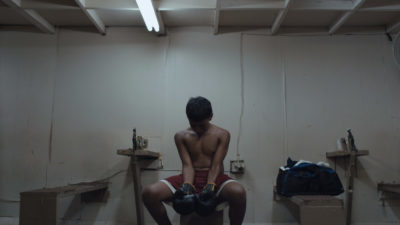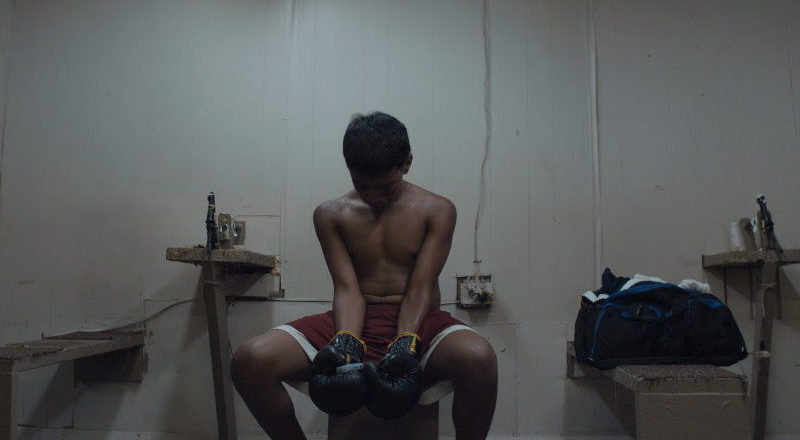INTERVIEW: Present-day Puerto Rico explored in ‘La Granja’

Audience members may be surprised to find out La Granja (The Farm) is not the work of a career-tested filmmaker who has been wowing crowds for decades. The film, a stirring drama that presents different tableaux images of present-day Puerto Rico, is actually the debut feature of director Angel Manuel Soto.
The movie, which premieres in theaters and VOD Friday, June 9, deals with the difficult issues of economic depression and drug addiction on the island. At the center of the narrative is a promising young boxer who tries to beat his way to success. Other characters in this drama speak to the undying pursuit of happiness of the island’s residents, even though conditions in the country have proved dire.
Soto was interested in showing a Puerto Rico outside of the beautiful beaches and coastal resorts. He achieved his goals with an authentic, tragic portrait that has won acclaim at international film festivals.
“It started about four years ago,” Soto said in a recent phone interview. “I decided to put together different ideas and stories that I had already been working on and apply it to the local tension and situation that Puerto Rico was facing, and that’s how La Granja came to be, a mixture of ideas of different personalities that were inspired by real-life people that I heard or know about.”
The production was on a tight schedule. There were 14 days of shooting and limited funds available. This meant that Soto had to be economical and extremely prepared with his ensemble, which largely consists of non-actors.
“In the case of La Granja, I wrote it knowing that I wanted to work with non-actors,” he said. “I showed it in a way that felt like you were a bystander with them, so it gave this impression that, even though you knew it was a film, it could easily be a documentary. So casting was very special because we cast the people for their faces and their looks, just by being themselves.”
Soto has always been a boxing fan, and the sport has a long history in Puerto Rico. Next to baseball, it’s one of the country’s favorite pastimes. “I tried boxing when I was little, but I failed miserably,” the director admitted. “I stopped practicing boxing, but there’s also a metaphor to be explored when it comes to boxing, and the struggle of the working class and the whole thing using us as entertainment beating each other up. So there was a bunch of metaphors in the sport that could very well be suited to represent Puerto Rico in the world.”
When La Granja started to premiere at film festivals, Soto had no idea what the reaction might be. He has been pleasantly surprised by the acclaim. The movie won the Best First Film Award at the Guadalajara Film Festival and was nominated for Best Foreign Language Film at the UK National Film Academy. It also played Fantastic Fest and the Tribeca Film Festival.
“When I did the film, of course, I wanted it to be in festivals and stuff, but I didn’t think that it was going to resonate so much,” he said. “A lot of the conversations that it has ignited at festivals has pretty much been one of the main purposes I made it, which is to shine a light to what’s going on in Puerto Rico, to start a conversation. … We made it with so much energy and so much heart that it feels good to know that the global film industry has received it so well. That’s what I want to do with my life. It’s kind of good to know my art is being received, and people are listening to what I want to say.”
He added: “One of my main goals was to actually create a mirror of our situation within my own country. At the same time, everybody knows that there’s this beautiful tropical island with clear waters, white sand beaches, beautiful people, palm trees, blue skies, rainforests, 500-year-old cities. I mean Puerto Rico is everything that it’s marketed, but it’s also everything that I’ve criticized. Obviously, as a tourist destination, people don’t want to know what’s going on in the back lot. Nobody wants to see what’s outside of the set, so, yeah, there’s a lot of things that are beautiful in Puerto Rico. That doesn’t mean it’s not at all a tourist destination, but there’s a couple million people that live on the island that you will never see because they are hidden behind the curtains. … The only Puerto Rico news was Ricky Martin, J. Lo and top five beaches of the world, so, yeah, everybody that goes to Puerto Rico, I really want them to enjoy the beautiful island. At the same time, wander or know that colonialism still exists, and Puerto Rico deserves better.”
Looking to the future, Soto has relocated to Los Angeles to take advantage of that city’s many filmic opportunities. He understands that in this highly competitive industry, nothing comes easy.
“Like everything, it’s a struggle, and there’s a lot of waiting in line,” he said. “It’s more who you know than what you know type of thing, but I found that this journey has been actually very fulfilling. I mean, I moved to Los Angeles for better opportunities in this industry, and I came here with La Granja when I finished it. And it’s been quite a journey. I guess I’ve been blessed in ways that I couldn’t fathom, granted that I’m a minority, and I’m here in the States in this weird time that the U.S. is having.”
By John Soltes / Publisher / John@HollywoodSoapbox.com
La Granja premiered in theaters and on VOD Friday, June 9. Click here for more information.

